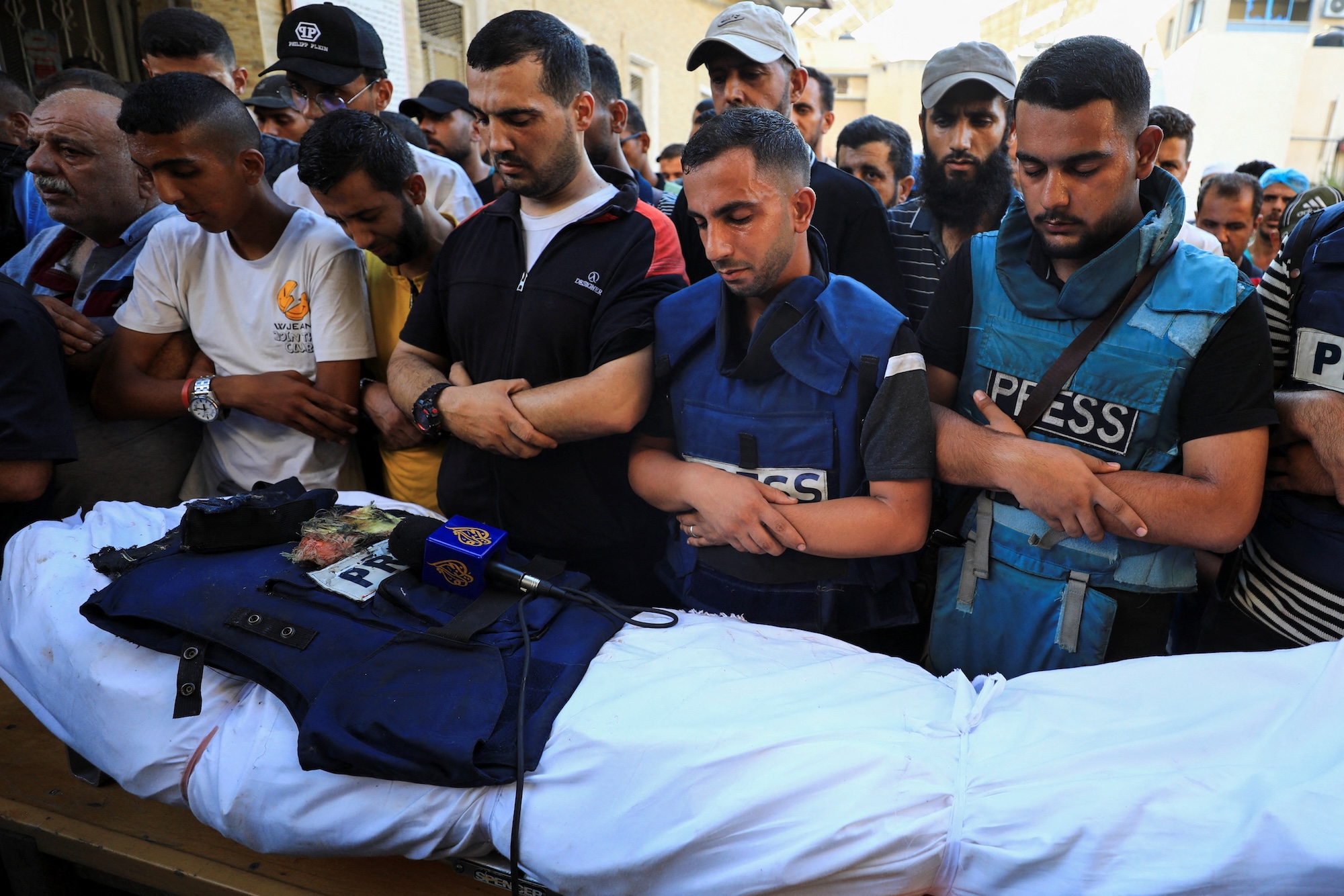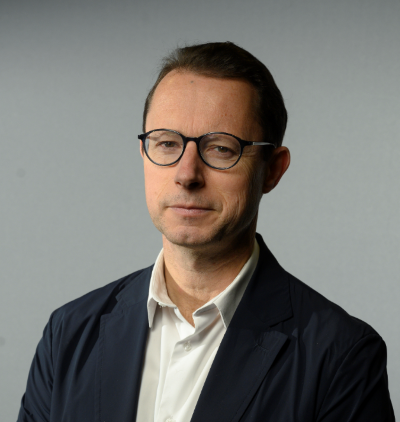Starved, displaced and exhausted: Inside AFP’s fight to protect its Gaza reporters

Al Jazeera journalist Anas Al Sharif, who was killed in an Israeli strike on 10 August 2025, prays next to the body of his colleague Al Jazeera reporter Ismail al-Ghoul, who also was killed in an Israeli strike on 31 July 2024. REUTERS/Dawoud Abu Alkas/File Photo
In late July, four of the largest providers of international news warned their Gaza journalists were starving. AFP, AP, BBC News and Reuters issued a joint call to Israel to allow journalists to enter and leave the Gaza Strip, and to allow adequate amounts of food to reach the people there.
A few days earlier, the journalists’ association for the wire service AFP (Agence France-Presse) stated support for freelance reporters employed by the outlet, who face extreme food shortages.
“Since AFP was founded in August 1944, we have lost journalists in conflicts, we have had wounded and prisoners in our ranks, but none of us can recall seeing a colleague die of hunger… We risk learning of their deaths at any moment, and this is unbearable,” the statement read. The organisation’s leadership called for Israeli authorities to allow its freelancers to evacuate Gaza.
As global news director, Phil Chetwynd is responsible for all of AFP’s journalists and all its journalism. AFP is a global news agency with around 1,700 journalists based in over 150 countries. I recently spoke to him about the dire situation faced by AFP’s freelancers and other journalists in Gaza, who live under threat of bombing, displacement and starvation, all while documenting the destruction of their own neighbourhoods for audiences around the world.
The day before we spoke, a targeted Israeli attack killed Al Jazeera’s entire Gaza City team, including the journalist Anas al-Sharif, widely recognised and followed for his on-screen reporting throughout the conflict. CPJ had warned his life was in danger just weeks ago.
During our conversation, Chetwynd provided details about the work of AFP’s journalists and freelancers in Gaza, the standards they follow and the incredible obstacles they face. The interview has been lightly edited for clarity and length.
Q. How many journalists is AFP working with right now in Gaza, and how has this number changed throughout the war?
A. We had a team of nine staff members in Gaza. They worked from an office in Gaza City, which we had to abandon under pressure from the Israeli military five days after Hamas' attacks on Israel on 7 October 2023. After six or seven months of non-stop coverage, very intense stories and also a lot of people losing their lives, including fellow journalists and people known to our journalists, we managed to get our staff team out around April 2024.
We had to get them out. You can’t do that kind of work every single day. People’s families were dying. We had to plan for what the future would be after that. So we started to work with people whom we knew and trusted. Although we had a staff team, we still used stringers and freelancers to complement their work. So we already had a base of some people we knew and also other trusted people our staff knew, so we put together a team of people working on text, photo and video, around eight or nine.

Phil Chetwynd.
Q. A lot of journalists have been killed in Gaza. Has your team had any casualties?
A. None of our staff: all nine got out safely. But that group probably lost more than 50 family members. That includes their extended families, but also quite close relatives. Every single one of them had their house or apartment destroyed, some of which would appear to have been targeted strikes. There were perhaps one or two people killed who had done occasional work for us in the past.
Q. What kind of work are AFP’s freelancers currently carrying out in Gaza?
A. We still have our former Gaza team, so in terms of the news-gathering process, they coordinate a lot of that from Cairo. They are still speaking to sources and they can still do a certain amount of reporting and fact-gathering virtually. They have a lot of excellent witnesses, trusted people whom they know, who can be somewhere and explain what they see.
But a lot of what AFP does in the international media is on the visual side, especially photo and video. How do we illustrate starvation or a lot of casualties in the hospital? It’s that sort of day-to-day news story that is very strong on the image side. We file a consistent amount of video and images. Today, for example, our freelancers have been at the funerals of the Al Jazeera team. Just looking at the Guardian, its coverage featured mostly our photos.
All our staff got out safely. But that group probably lost more than 50 family members. That includes their extended families, but also quite close relatives. Every single one of them had their house or apartment destroyed, some of which would appear to have been targeted strikes.

Q. Which kinds of struggles do your freelancers face?
A. The thing that I would always stress concerning Gaza is that people from the outside imagine that journalists are running around, doing their job every day. But these are not foreign correspondents who’ve gone to find a story. These are all journalists who live in Gaza, and therefore have responsibilities to their families, children, husbands, wives, and so on. And that’s very different from being sent somewhere where you’re on your own, you’ve decided to go there, and you can just focus on the story and your job.
From the very beginning, our journalists who were there, and now the people who work for us, have had to focus on trying to keep their families and relatives alive and fed. And that takes up a huge amount of time, stress and work every day. Sometimes that involves moving house, apartment, or place, because the dangers are coming and going all the time. That’s a big part of the daily struggle; it’s sometimes astonishing they manage to do any work at all.
And then you have to imagine currently doing that in a context where people are extremely weak from lack of food. Our freelancers are all surviving on small amounts of food. They are all tired. Some of them have lost 20 or 30 kilos. They are all involved in that battle for food. A lot of them talk about dizziness, headaches, and weakness. Some days, they are just not able to get up.
Another thing to bear in mind is that there’s no real transport in Gaza. We think of Gaza as being a small place, which it is, but an event can happen, and to get there, some of our people will have to walk up to 25 kilometres a day. It’s the only way to get around, because fuel is so expensive and hugely rationed. So imagine doing that in high temperatures with a lack of food and even a lack of access to drinking water. The physical challenges of doing the job are very considerable.
Our journalists have had to focus on trying to keep their families and relatives alive and fed. And that takes up a huge amount of time, stress and work every day. Sometimes that involves moving house, apartment, or place, because the dangers are coming and going all the time. It’s astonishing they manage to do any work at all.

Q. How are you paying your freelancers?
A. We try to help them as much as we can, with moral support and with any kind of concrete support. We can still pay them. There’s a complicated process, but it seems to work. But there’s a huge amount of transaction cost that gets lost in the mix, which is involved for money changes to actually access cash, which we try to compensate for by paying more to cover that. But these things fluctuate a lot.
Then, of course, there is just the price of the most basic foodstuffs. Somebody was quoting to me the other day, something like the equivalent of 80 or 90 euros for a pound of sugar. These are huge sums of money. So we can get the money and they can be paid. But the challenge is just finding food in any kind of reasonable quantity. Sometimes our freelancer might be the only breadwinner for their family. The daily battle to find food and to feed their family is immense.
Q. Is AFP providing support in any other ways?
A. Before leaving, our journalists stockpiled things like protective gear. Depending on what’s going on, that can provide limited protection, especially if you’re being directly targeted. What’s important, which we’re trying to do at the moment, is for our freelancers to know that there’s an organisation working for them and communicating on their behalf. We are trying to get some of them out, not because they want to abandon the story, but because they’re worried about their families. They’re very worried about their children, and they’re desperate. It’s very hard.
Q. What are the obstacles to evacuating your freelancers?
A. It’s a complicated dance and not very transparent, but you need agreement from the Israelis, and you need support from state sponsors to push pretty hard. The government of Qatar was very helpful to us the first time around, and the French government is always very supportive of journalists in difficulty. But at the moment, there’s not much movement from anywhere. So we are very actively engaged in the diplomatic effort.
Q. In light of the recent killing of the six Al Jazeera reporters and team members, which followed claims by Israel of ties to Hamas, are you concerned about narratives that paint Palestinian journalists as a whole as unreliable, not credible? How can this affect your freelancers still on the ground?
A. We’re very used to this. We’ve seen this from the very beginning of the story, this attempt to dehumanise Palestinian journalists, as if to say they are not journalists, or some sort of inferior journalists. The journalists who work for us, our staff members in Gaza, who worked for AFP for 20 or 30 years, they won some of the biggest prizes in journalism: World Press Photo, Bayeux Calvados-Normandy Award for war correspondents, and so on.
These people have been working to the ethical standards of AFP for 20 or 30 years. They are just journalists to us. But there is a campaign to smear and undermine many good, hard-working and ethical journalists in Gaza, and you don’t see that anywhere else in the world. We have journalists all over the place. Our journalists in Afghanistan have never been accused of working for the Taliban or anything like that.
I can’t speak for every news organisation. I’m going to speak for AFP: we’ve had to deal with these allegations from time to time, and they can be extremely unfair and hard to rebut. How do you rebut a negative? It’s extremely hard.
One very unfair thing is that there’s a sort of game to show journalists who have been working there, pictured with people from Hamas. Well, Hamas has been running the Gaza Strip for more than 20 years. They were the de facto government there. Many people have been working with the de facto government of the Gaza Strip over the last 20 years, including, for a time, the Israelis.
Pictures of a journalist interacting with Hamas figures at some point in the last 20 years just don’t show anything. It is your job as a journalist in any country or territory to have contacts and to understand the ruling authority of that area. Our journalists in Afghanistan try to have the maximum amount of contact they can with the Taliban, for example, yet they are not accused of being terrorists.
Q. Is it a lot harder to stick to the standards that you usually maintain in terms of fact-checking and sourcing information, with all these restrictions and risks?
A. I had a robust discussion with the Israeli government and authorities, and one thing I said to them is, I find it very difficult to have criticism of our work in Gaza, when there are such huge efforts made to prevent us from doing our work there.
Every single journalist in Gaza is going to be extremely fearful of doing anything, of going anywhere, fearful of doing their job. And so all this context makes it that much harder for people to get information, and to be able to go somewhere and be on the scene and to witness something, because simply being there is an extremely dangerous thing to do, so it has a chilling effect.
Q. Journalists are now being targeted while openly identifying as members of the press. Will AFP change its security protocols and training for conflict zones?
A. We’re in a very precarious time. Gaza is probably the most serious manifestation of it, but you could also look at the war in Ukraine. The period in which you could identify as a journalist and have some confidence that you would be treated with respect or neutrality by combatants is gone. At the moment, some of the biggest threats come from the air. They come from surveillance. They come from drone technology. They come from AI. They come from things that are just going so fast around us and are almost impossible to counter.
This is a very perilous time to be a journalist, and it has also coincided with the global rise of populism and authoritarianism, where there is no strong moral voice sticking up for journalists. You can even see it today. There are strong statements from the CPJ and RSF, the press freedom groups of our industry, but there are very few strong comments from governments on this. There’s been very little government pressure anywhere in the world to convince the Israelis to open up Gaza and allow foreign journalists in.
Some of the biggest threats come from the air. They come from surveillance. They come from drone technology. They come from AI. They come from things that are just going so fast around us and are almost impossible to counter.

Q. What do you think is needed to allow international journalists to enter Gaza?
A. There is no precedent for the exclusion of journalists from Gaza. Israel says this has been done for our protection. But what protection? We don’t make a distinction between a Palestinian who works for us and an Israeli who works for us. So the safety argument does not hold up. We’ve covered every conflict since the Crimean War [in the 1850s]. We were in Syria and Iraq when it was extremely dangerous. From the very beginning, we said it was essential that Israel open up Gaza to our journalists.
We’ve had previous conflicts in Gaza, and we’ve always put people in from the outside to work alongside our Palestinian colleagues. We’ve also always said there are probably things that our Palestinian journalists can’t do because they can’t go; it is their community. So there are also stories that are more easily reported by people from the outside coming in. We want to understand what’s going on in Gaza. They should, of course, allow journalists in, and they should do it immediately. There’s no excuse.
In every email we send you'll find original reporting, evidence-based insights, online seminars and readings curated from 100s of sources - all in 5 minutes.
- Twice a week
- More than 20,000 people receive it
- Unsubscribe any time
signup block
In every email we send you'll find original reporting, evidence-based insights, online seminars and readings curated from 100s of sources - all in 5 minutes.
- Twice a week
- More than 20,000 people receive it
- Unsubscribe any time





